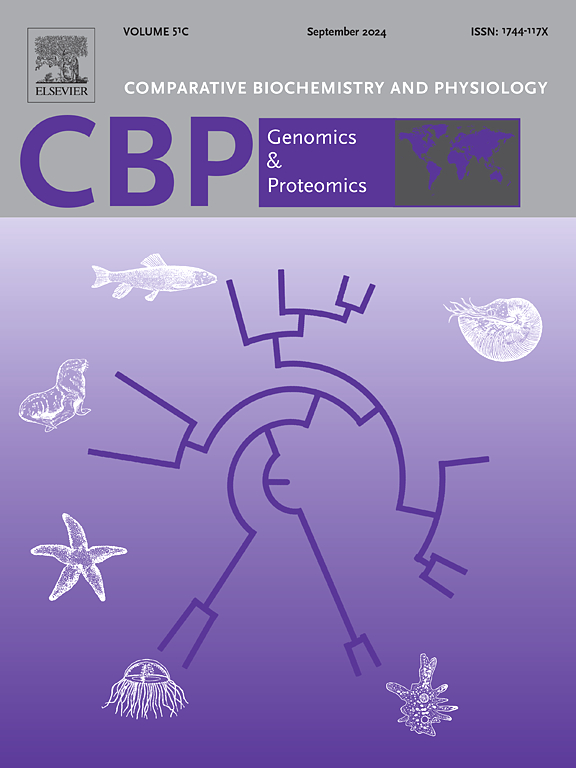比较蛋白质组学分析揭示了淡水水蛭(Whitmania pigra)对热胁迫的响应机制。
IF 2.2
2区 生物学
Q4 BIOCHEMISTRY & MOLECULAR BIOLOGY
Comparative Biochemistry and Physiology D-Genomics & Proteomics
Pub Date : 2024-12-22
DOI:10.1016/j.cbd.2024.101406
引用次数: 0
摘要
温度是一种显著影响拟温热动物——白腰鼠兔生存和机体健康的环境参数。热应激破坏肠组织的生理稳态。然而,目前还没有关于水蛭在热应激条件下肠黏膜反应的研究报道。为了鉴定参与热应激反应的生物标记蛋白,我们对暴露于27°C和35°C的水蛭肠道进行了基于串联质量标签(TMT)的比较蛋白质组学分析。与对照组相比,35℃热应激组在应激后第3天的累积死亡率升高。同时,肠道丙二醛(MDA)含量显著上调,总抗氧化能力(T-AOC)显著下调。通过蛋白质组学分析,共鉴定出3935个蛋白。热应激产生144种差异蛋白;75个上调,69个下调。热应激反应的差异表达蛋白主要涉及钙结合蛋白、分子伴侣蛋白、细胞骨架完整性、免疫功能和炎症反应、DNA损伤与修复、核糖体蛋白合成、应激激素和神经递质、肿瘤发生、细胞凋亡等。蛋白-蛋白网络互作分析表明,HSP、CD8A、C3、CD63、CD81、MRPL58、MRPL15、HNRNPA1、AMBP、IGHEP1、serpin1、CYP3A4、ATP12A、RPS13、CaM、HSP70结合蛋白、HSPA6、C4A、ANXA7、ARG1、ARG2、ATP1B、CALCA、HTR1B和GNGT1是水蛭抵抗热应激的关键蛋白。我们的研究结果系统地提供了大量应对热应激的候选蛋白,并增强了我们对热敏感动物金貂草面对热暴露的内在反应机制的理解。本文章由计算机程序翻译,如有差异,请以英文原文为准。

Comparative proteomic analysis reveals the response mechanism of freshwater leech (Whitmania pigra) under heat-stress challenge
Temperature is an environmental parameter that remarkably affects the survival and organism health of poikilothermal animal-Whitmania pigra Whitman. Heat stress destroys the physiological homeostasis of intestine tissue. However, no studies on the intestinal mucosa response of leech exposure to heat stress have been reported so far. To identify the biomarker proteins involved in heat stress response, we performed a Tandem mass tag (TMT)-based comparative proteomic analysis on leech's intestine after exposing to 27 °C and 35 °C. The cumulative mortality in the 35 °C heat stress group increased on the third day after stress compared with the control group. Mean-while, intestinal malondialdehyde (MDA) content was significantly up-regulated whereas total antioxidant capacity (T-AOC) was significantly down-regulated. A total of 3935 proteins were identified through proteomic analysis. Heat stress resulted in 144 differential proteins; 75 were up-regulated, and 69 were down-regulated. The differential expression proteins in response to heat stress are mainly involved in calcium-binding proteins, molecular chaperones, cytoskeleton integrity, immune function and inflammation response, DNA damage and repair, ribosomal protein synthesis, stress hormones and neuro-transmitters, tumorigenesis, and apoptosis. Protein-protein network interaction analysis showed that HSP, CD8A, C3, CD63, CD81, MRPL58, MRPL15, HNRNPA1, AMBP, IGHEP1, SERPINC1, CYP3A4, ATP12A, RPS13, CaM, HSP70 binding protein, HSPA6, C4A, ANXA7, ARG1, ARG2, ATP1B, CALCA, HTR1B, and GNGT1 are the critical proteins of leeches resistance to heat stress. Our results systematically provide substantial responsive candidate proteins combating heat stress and enhance our understanding of the intrinsic response mechanisms of thermal sensitivities animal W. pigra facing heat exposure.
求助全文
通过发布文献求助,成功后即可免费获取论文全文。
去求助
来源期刊
CiteScore
5.10
自引率
3.30%
发文量
69
审稿时长
33 days
期刊介绍:
Comparative Biochemistry & Physiology (CBP) publishes papers in comparative, environmental and evolutionary physiology.
Part D: Genomics and Proteomics (CBPD), focuses on “omics” approaches to physiology, including comparative and functional genomics, metagenomics, transcriptomics, proteomics, metabolomics, and lipidomics. Most studies employ “omics” and/or system biology to test specific hypotheses about molecular and biochemical mechanisms underlying physiological responses to the environment. We encourage papers that address fundamental questions in comparative physiology and biochemistry rather than studies with a focus that is purely technical, methodological or descriptive in nature.

 求助内容:
求助内容: 应助结果提醒方式:
应助结果提醒方式:


